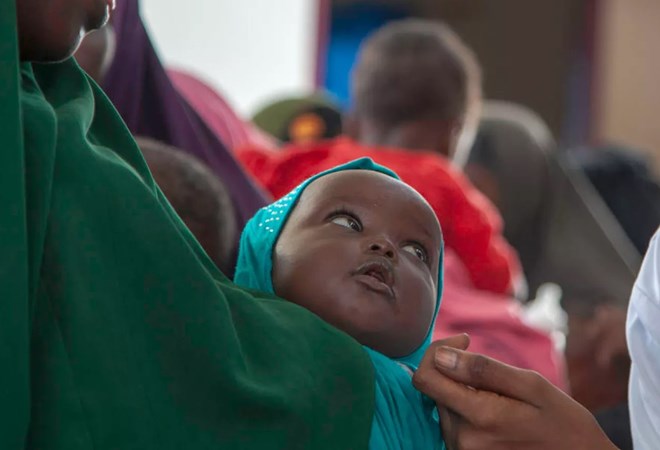
Wednesday September 4, 2024

A Somali mother cradles her child during a health clinic visit in Mogadishu. The clinic provides vital services to ensure healthy growth and development for infants. Credit: UNICEF Somalia/2019/Naftalin
Hargeisa (HOL) — A new study conducted at Mogadishu Somali Turkish Training and Research Hospital has revealed that traditional cervical cauterization, a widely practiced procedure in Somalia, significantly raises the risk of preterm births. According to the study, women who underwent this procedure were more than twice as likely to experience preterm deliveries compared to those who had not.
Traditional cervical cauterization involves burning the cervix, the lower part of the uterus, with a hot metal rod or other heated instruments. In Somalia, traditional healers commonly use this practice to treat conditions like infections or infertility. However, medical professionals warn that it can lead to serious complications, including infections and scarring, which harm a woman's reproductive health.
The study, published in Scientific Reports, involved 702 pregnant women and found that 46.7% had undergone cervical cauterization. The research showed a strong correlation between this traditional practice and adverse pregnancy outcomes, with women who had been cauterized being 2.64 times more likely to deliver preterm babies. This risk increased with repeated cauterizations, posing a severe threat to maternal and fetal health.
Despite its prevalence, the study revealed that nearly half of the women who underwent the procedure experienced complications, including infections and cervical scarring. Lead researcher Dr. Ahmed Issak Hussein stressed the urgency of addressing the risks associated with this harmful tradition.
Dr. Ahmed Issak Hussein and his team concluded that women who undergo cervical cauterization face a significantly higher risk of preterm birth, which may result in serious complications for both the mother and the child.
The study showed that low-income women and those with limited education were the most likely to undergo the procedure. Many of these women were treated by traditional birth attendants, with 86% of the cauterizations performed using hot metal rods.
Cervical cauterization is just one of several harmful traditional practices (HTPs) in Somalia, alongside female genital mutilation and early marriage. These practices, deeply rooted in cultural beliefs, continue to pose severe health risks, particularly in rural areas where access to modern healthcare is limited.
The World Health Organization (WHO) has consistently warned against HTPs, citing a lack of scientific evidence and the dangers they present. The study's findings underscore the urgent need for healthcare education in Somalia to mitigate these risks.
The researchers highlighted the importance of health workers and community leaders in raising awareness about the risks of cervical cauterization and promoting safer medical alternatives.
The study recommended targeted public health campaigns to raise awareness about the dangers of cervical cauterization, particularly in rural areas. Traditional birth attendants should also be trained to adopt safer practices, reducing the reliance on dangerous methods.
The researchers called for further studies to explore the long-term effects of cervical cauterization on maternal health and for increased efforts to curb the use of harmful traditional practices.